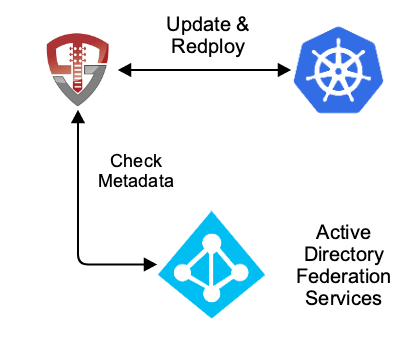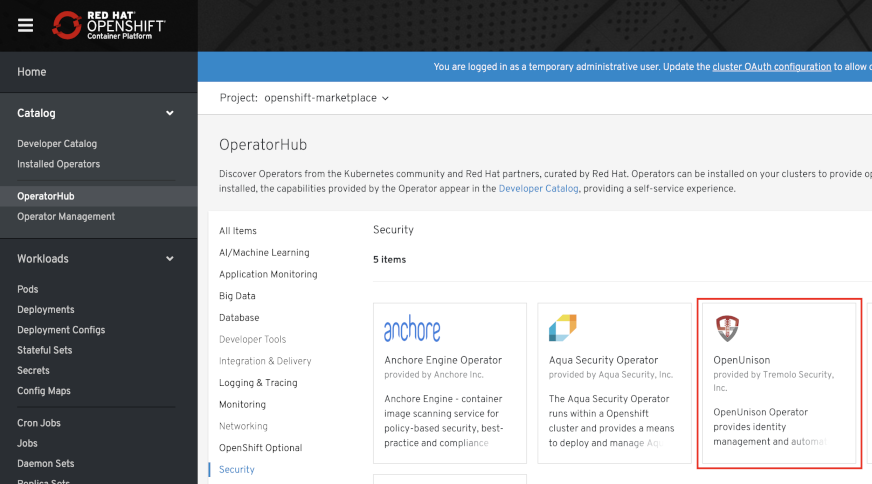OpenUnison Operator for Kubernetes and OpenShift
The OpenUnison operator provides an operations automation mechanism for OpenUnison instances running on Kubernetes and OpenShift. The operator will generate the secrets and objects needed to run OpenUnison:
- Certificate and key generation - no need to ever run the java
keytoolto generate certificates or keys - Creation of the
Secrets,Deployments,Services andIngressrules for OpenUnison - On OpenShift
Routes,DeploymentConfigs,ImageStreams andBuilds - Import Saml2 Metadata from a URL or direct from XML
- Initialize your database to track audit data
- Deploy and operate ActiveMQ for high availability
Why an Operator?
Operators help automate common tasks. For OpenUnison the most common tasks are related to certificate management and service accounts. For instance when working with a remote SAML2 identity provider like Active Directory Federation Services OpenUnison can check if the trusted certificates have rolled-over and if so redeploy automatically without any administrative intervention.
In addition to automating common operations tasks, the operator provides you a Kubernetes native way to update OpenUnison's configuration. Updating your configuration is now a matter of updating objects in Kubernetes instead of having to manually generate keystores or network configurations.
Deploying the OpenUnison Operator
OpenShift 4 - Certified Operator
From inside OCP4, go to the Operator Hub and look for the OpenUnison certified operator:
Kubernetes and OpenShift 3.x
The OpenUnison operator runs with minimal privileges in the namespace where OpenUnison will run. Prior to deploying the operator you need to install the CRD for OpenUnison as an id with the ability to deploy CRD objects:
kubectl create -f https://raw.githubusercontent.com/TremoloSecurity/openunison-k8s-operator/master/src/main/yaml/openunison-operator-crd.yaml
Once the CRD is deployed, as a namespace administrator you need to create the RBAC rules and ServiceAccount:
kubectl create -f https://raw.githubusercontent.com/TremoloSecurity/openunison-k8s-operator/master/src/main/yaml/openunison-operator-deploy.yaml -n openunison
Finally, deploy the operator. When running on OpenShift, we OpenShift native objects:
kubectl create -f XXXXXXX
Or in Kubernetes:
kubectl create -f https://raw.githubusercontent.com/TremoloSecurity/openunison-k8s-operator/master/src/main/yaml/openunison-operator-deployment.yaml -n openunison
Once deployed, a pod will be running waiting for OpenUnison custom resources to be deployed.
Upgrading the Operator
The OpenUnison operator is updated regularly as known CVEs are patched. The simplest way to update the operator is to kill the operator's pod and let it pull the latest version.
Upgrading Existing OpenUnison Instances
Use the converter tool to generate an OpenUnison CR - TODO
The OpenUnison Custom Resource
The OpenUnison custom resource is used to configure:
- The OpenUnison network configuration - ie ciphers, which keys to use for TLS, etc.
- The OpenUnison PKCS12 Keystore - All keys and certificates are generated based on Kubernetes secrets. There's no need to use the Java
keytool. - Parameters
Secret- OpenUnison lets you integrate parameters into your configuration so that configuration can be stored safely in source control and be used across environments. This data now comes from Kubernetes objects instead of having to be embedded in one large secret.
Here's an example of a simple OpenUnison CR for Kubernetes:
apiVersion: openunison.tremolo.io/v1
kind: OpenUnison
metadata:
name: test-openunison
namespace: openunison
spec:
image: tremolosecurity/openunison-simple
replicas: 1
enable_activemq: false
dest_secret: openunison
source_secret: openunison-secrets-source
hosts:
- names:
- name: test.apps.mydomain.com
env_var: OU_HOST
ingress_name: openunison
secret_name: ou-tls-certificate
secret_data:
- unisonKeystorePassword
- TEST_USER_PASSWORD
- REG_CRED_PASSWORD
non_secret_data:
- name: REG_CRED_USER
value: rh_user
- name: TEST_USER_NAME
value: testuser
- name: MYVD_CONFIG_PATH
value: WEB-INF/myvd.conf
- name: unisonKeystorePath
value: /etc/openunison/unisonKeyStore.p12
openunison_network_configuration:
open_port: 8080
open_external_port: 80
secure_port: 8443
secure_external_port: 443
secure_key_alias: unison-tls
force_to_secure: true
activemq_dir: /tmp/amq
quartz_dir: /tmp/quartz
client_auth: none
allowed_client_names: []
ciphers:
- TLS_RSA_WITH_RC4_128_SHA
- TLS_RSA_WITH_AES_128_CBC_SHA
- TLS_RSA_WITH_AES_256_CBC_SHA
- TLS_RSA_WITH_3DES_EDE_CBC_SHA
- TLS_RSA_WITH_AES_128_CBC_SHA256
- TLS_RSA_WITH_AES_256_CBC_SHA256
path_to_deployment: /usr/local/openunison/work
path_to_env_file: /etc/openunison/ou.env
key_store:
static_keys:
- name: session-unison
version: 1
trusted_certificates:
- name: trusted-adldaps
pem_data: |-
-----BEGIN CERTIFICATE-----
MIIDNDCCAhygAwIBAgIQbRNj6RKqtqVPvW65qZxXXjANBgkqhkiG9w0BAQUFADAi
MSAwHgYDVQQDDBdBREZTLkVOVDJLMTIuRE9NQUlOLkNPTTAeFw0xNDAzMjgwMTA1
MzNaFw0yNDAzMjUwMTA1MzNaMCIxIDAeBgNVBAMMF0FERlMuRU5UMksxMi5ET01B
SU4uQ09NMIIBIjANBgkqhkiG9w0BAQEFAAOCAQ8AMIIBCgKCAQEA2s9JkeNAHOkQ
1QYJgjefUwcaogEMcaW/koA+bu9xbr4rHy/2gN/kc8OkoPuwJ/nNlOIO+s+MbnXS
L9mUTC4OK7trkEjiKXB+D+VSYy6imXh6zpBtNbeZyx+rdBnaOv3ByZRnnEB8LmhM
vHA+4f/t9fx/2vt6wPx//VgIq9yuYYUQRLm1WjyUBFrZeGoSpPm0Kewm+B0bhmMb
dyC+3fhaKC+Uk1NPodE2973jLBZJelZxsZY40Ww8zYQwdGYIbXqoTc+1a/x4f1En
m4ANqggHtw+Nq8zhss3yTtY+UYKDRBILdLVZQhHJExe0kAeisgMxI/bBwO1HbrFV
+zSnk+nvgQIDAQABo2YwZDAzBgNVHSUELDAqBggrBgEFBQcDAQYIKwYBBQUHAwIG
CisGAQQBgjcUAgIGCCsGAQUFBwMDMB0GA1UdDgQWBBTyJUfY66zYbm9i0xeYHuFI
4MN7uDAOBgNVHQ8BAf8EBAMCBSAwDQYJKoZIhvcNAQEFBQADggEBAM5kz9OKNSuX
8w4NOgnfIFdazd0nPlIUbvDVfQoNy9Q0S1SFUVMekIPNiVhfGzya9IwRtGb1VaBQ
AQ2ORIzHr8A2r5UNLx3mFjpJmeOxQwlV0X+g8s+253KVFxOpRE6yyagn/BxxptTL
a1Z4qeQJLD42ld1qGlRwFtVRmVFZzVXVrpu7NuFd3vlnnO/qKWXU+uMsfXtsl13n
ec1kw1Ewq2jnK8WImKTQ7/9WbaIY0gx8mowCJSOsRq0TE7zK/N55drN1wXJVxWe5
4N32eCqotXy9j9lzdkNa7awb9q38nWVxP+va5jqNIDlljB6tExy5n3s7t6KK6g5j
TZgVqrZ3+ms=
-----END CERTIFICATE-----
key_pairs:
create_keypair_template:
- name: ou
value: k8s
- name: o
value: Tremolo Security
- name: l
value: Alexandria
- name: st
value: Virginia
- name: c
value: US
keys:
- name: unison-tls
tls_secret_name: unison-tls-secret
import_into_ks: keypair
create_data:
sign_by_k8s_ca: false
server_name: test-openunison.openunison.svc.cluster.local
subject_alternative_names: []
key_size: 2048
ca_cert: true
- name: unison-ca
tls_secret_name: ou-tls-certificate
import_into_ks: certificate
create_data:
sign_by_k8s_ca: false
server_name: test.apps.mydomain.com
subject_alternative_names: []
key_size: 2048
ca_cert: false
hosts
The hosts section tells the operator what Ingress objects to create in Kubernetes or Routes in OpenShift. Each host has its host name stored in the environment secret so it can be used in the OpenUnison configuration. On Kubernetes you can have multiple host names on a single Ingress object, on OpenShift each Route can have only one host name.
On Kubernetes, you specify the name of the keypair used for the ingress object.
secret_data
This section lists the data elements in the source_secret that should be imported into the OpenUnison environments secret.
non_secret_data
Use this section for defining parameters that aren't considered secrets. For instance environment parameters, host names, etc. Never store passwords in this section.
openunison_network_configuration
The network configuration for OpenUnison, usually can be used as is.
key_store
This section defines what will be in the keystore used by OpenUnison. Well discuss each section.
static_keys
OpenUnison makes extensive use of static AES-256 keys. This section lets you define what keys to create. Each key listed is added to a Secret that stores these keys. When the version is changed, the operator will generate a new key and add it to the keystore.
trusted_certificates
Each member of this list is added to the keystore as a trusted certificate. Examples are remote LDAPS services that need to be trusted.
key_pairs
The OpenUnison operator can either generate self-signed certificates or include TLS key pairs stored as Secrets in Kubernetes.
create_keypair_template
This section defines the components of a generated keypair's subject EXCEPT for the host name.
keys
Each key listed is either imported from the Secret named by tls_secret_name if it exist or generates it and stores it in tls_secret_name. When the certificate is generated it is self signed. The subject is generated based on the create_data section. The generated certificate will use the server_name in the subject and will generate a list of subject alternative names including the server_name.
OpenUnison CR on OpenShift
The OpenUnison operator will deploy into OpenShift using OpenShift native objects. If the operator is deployed on OpenShift the image option is ignored and instead use the openshift section to drive the s2i process.
Here's a very simple example of an OpenUnison CR that will launch an OpenUnison instance with just a test user in OpenShift:
apiVersion: openunison.tremolo.io/v1
kind: OpenUnison
metadata:
name: test-openunison
namespace: openunison
spec:
openshift:
git:
repo: 'https://github.com/TremoloSecurity/openunison-qs-simple.git'
branch: master
dir: /
builder_image: registry.connect.redhat.com/tremolosecurity/openunison-s2i-10
replicas: 1
enable_activemq: false
dest_secret: openunison
source_secret: openunison-secrets-source
hosts:
- names:
- name: test.apps.mydomain.com
env_var: OU_HOST
ingress_name: openunison
secret_data:
- unisonKeystorePassword
- TEST_USER_PASSWORD
- REG_CRED_PASSWORD
non_secret_data:
- name: REG_CRED_USER
value: rh_user
- name: TEST_USER_NAME
value: testuser
- name: MYVD_CONFIG_PATH
value: WEB-INF/myvd.conf
- name: unisonKeystorePath
value: /etc/openunison/unisonKeyStore.p12
openunison_network_configuration:
open_port: 8080
open_external_port: 80
secure_port: 8443
secure_external_port: 443
secure_key_alias: unison-tls
force_to_secure: true
activemq_dir: /tmp/amq
quartz_dir: /tmp/quartz
client_auth: none
allowed_client_names: []
ciphers:
- TLS_RSA_WITH_RC4_128_SHA
- TLS_RSA_WITH_AES_128_CBC_SHA
- TLS_RSA_WITH_AES_256_CBC_SHA
- TLS_RSA_WITH_3DES_EDE_CBC_SHA
- TLS_RSA_WITH_AES_128_CBC_SHA256
- TLS_RSA_WITH_AES_256_CBC_SHA256
path_to_deployment: /usr/local/openunison/work
path_to_env_file: /etc/openunison/ou.env
key_store:
static_keys:
- name: session-unison
version: 1
trusted_certificates: []
key_pairs:
create_keypair_template:
- name: ou
value: k8s
- name: o
value: Tremolo Security
- name: l
value: Alexandria
- name: st
value: Virginia
- name: c
value: US
keys:
- name: unison-tls
tls_secret_name: unison-tls-secret
import_into_ks: keypair
create_data:
sign_by_k8s_ca: false
server_name: test-openunison.openunison.svc.cluster.local
subject_alternative_names: []
key_size: 2048
ca_cert: true
openshift
This section is specific for OpenShift deployments (both 3.x and 4.x) that controls the build process of an OpenUnison container via the Source-to-Image system. The git section tells the builder where to get the OpenUnison source that is fed into the OpenUnison builder image. The builder_image points to the s2i image to use. Here we're pointing to the Red Hat certified image. The upstream CentOS version is available at tremolosecurity/openunisons2idocker:latest.

